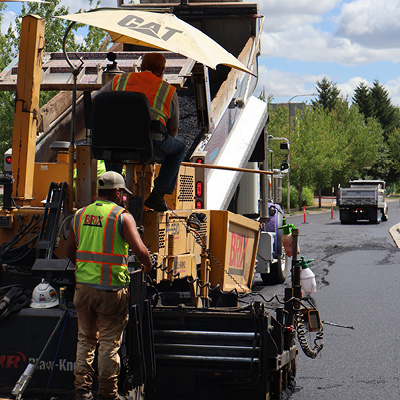Experienced Paving Experts for Perfect Surfaces
Checking Out the Numerous Sorts Of Asphalt Paving and Their Advantages
The landscape of asphalt paving includes a variety of types, each crafted to deal with details requirements and ecological considerations. From the robust features of Hot Mix Asphalt to the eco-friendly qualities of Recycled Asphalt Sidewalk, understanding these options can significantly affect project results. Technologies such as Warm Mix Asphalt and Porous Asphalt introduce extra layers of performance and sustainability. As we explore these different paving services, the nuanced benefits they supply may amaze you and possibly modify your approach to future paving tasks.
Hot Mix Asphalt
When thinking about one of the most efficient leading options, warm mix asphalt (HMA) sticks out as a leading option for lots of applications (paving service). HMA is a flexible leading material understood for its sturdiness, versatility, and general performance. It is produced by heating asphalt binder and incorporating it with accumulations at high temperature levels, making certain a consistent blend that can stand up to different environmental conditions
Among the key advantages of HMA is its ability to provide a smooth, skid-resistant surface, boosting security for automobiles and pedestrians alike. Furthermore, HMA exhibits superb resistance to contortion, making it suitable for high-traffic areas such as highways and parking whole lots. Its versatility to different environments additionally adds to its widespread usage.
The setup procedure of HMA is fairly quick, enabling effective project conclusion with very little disruption to website traffic. Additionally, it can be recycled, minimizing waste and promoting sustainability within the building and construction market. In general, warm mix asphalt stays a leading option for leading experts as a result of its robust efficiency qualities and long-term cost-effectiveness, making it a dependable remedy for different framework needs
Cozy Mix Asphalt
Warm mix asphalt (WMA) uses an innovative option to hot mix asphalt, giving similar advantages while calling for lower manufacturing temperatures. Usually generated at temperatures between 190 ° F and 250 ° F, WMA modern technology decreases power intake and greenhouse gas emissions during production, making it a more eco-friendly alternative.
One of the essential benefits of WMA is its extensive workability period. The lower temperature levels permit more effective transport and positioning, specifically in cooler weather. This versatility can cause boosted compaction and overall resilience of the asphalt surface area. Furthermore, WMA can be made use of in numerous applications, varying from highways to residential driveways, without jeopardizing performance.

The consolidation of additives or modified binders in WMA contributes to its enhanced residential or commercial properties, guaranteeing that it meets or exceeds efficiency requirements. Moreover, WMA's minimized thermal effect during manufacturing can reduce the probability of damage to the surrounding environment, making it an enticing option for sustainable paving practices.
Cold Mix Asphalt
Cold mix asphalt is a flexible paving remedy generally made use of for short-term repairs and low-traffic locations. This kind of asphalt is produced at ambient visit site temperatures, making it a practical choice for quick solutions and projects where standard warm mix asphalt may not be practical. The mixture normally contains asphalt binder, aggregate, and ingredients, permitting it to remain convenient for an extensive period.
One of the main advantages of cool mix asphalt is its ease of application. It can be set up without customized tools, making it available for smaller sized service providers and DIY enthusiasts. Furthermore, cool mix can be used in numerous weather, which is especially helpful for immediate repair needs.

It may not give the exact same long-lasting resilience as warm mix asphalt, its quick application and adaptability make it a superb option for short-term solutions and low-traffic applications. Generally, chilly mix asphalt remains a functional option in the asphalt paving landscape.
(view article)
Permeable Asphalt
Permeable asphalt is an ingenious paving solution developed to enhance stormwater monitoring and decrease surface drainage. This type of asphalt includes a special structure that includes interconnected spaces, allowing water to penetrate through the surface area and into the underlying layers. By facilitating all-natural drainage, permeable asphalt helps minimize the risk of flooding and lessens the problem on municipal stormwater systems.
Among the primary advantages of porous asphalt is its capability to boost water high quality. As stormwater filters through the pavement, toxins and sediments are entraped, decreasing the variety of contaminants that get in local rivers. This adds to healthier ecological communities and supports conformity with ecological policies.
In addition, porous asphalt can improve the long life of the pavement itself. By minimizing water buildup on the surface, it lessens the potential for freeze-thaw cycles that can result in fracturing and deterioration. The decreased demand for typical stormwater management infrastructure can result in expense financial savings for districts and programmers.
Recycled Asphalt Pavement
(try it now)Recycled asphalt pavement (RAP) represents a sustainable strategy to roadway building and upkeep that profits both the setting and the economy. By reusing existing asphalt materials, RAP minimizes the need for brand-new raw products, which in turn conserves natural resources and lessens ecological influence. This technique lowers energy consumption and greenhouse gas emissions connected with the production of new asphalt.
The consolidation of RAP right into brand-new sidewalk blends can additionally bring about substantial price financial savings. Contractors can leverage recycled materials to reduce overall task expenditures, making it a financially sensible choice for communities and personal designers alike. Furthermore, RAP uses similar performance characteristics to virgin asphalt, guaranteeing resilience and longevity in road surface areas.
RAP's convenience enables it to be used in various applications, including freeways, car park whole lots, and property driveways. By improving the structural honesty of existing sidewalks, RAP contributes to improved safety and security and level of smoothness of streets.
Conclusion
Warm Mix Asphalt excels in sturdiness and rapid setup for high-traffic locations, while Warm Mix Asphalt improves sustainability with reduced energy intake. Cold Mix Asphalt serves as a cost-effective option for urgent fixings, Porous Asphalt efficiently takes care of stormwater, and Recycled Asphalt Pavement promotes ecological responsibility.